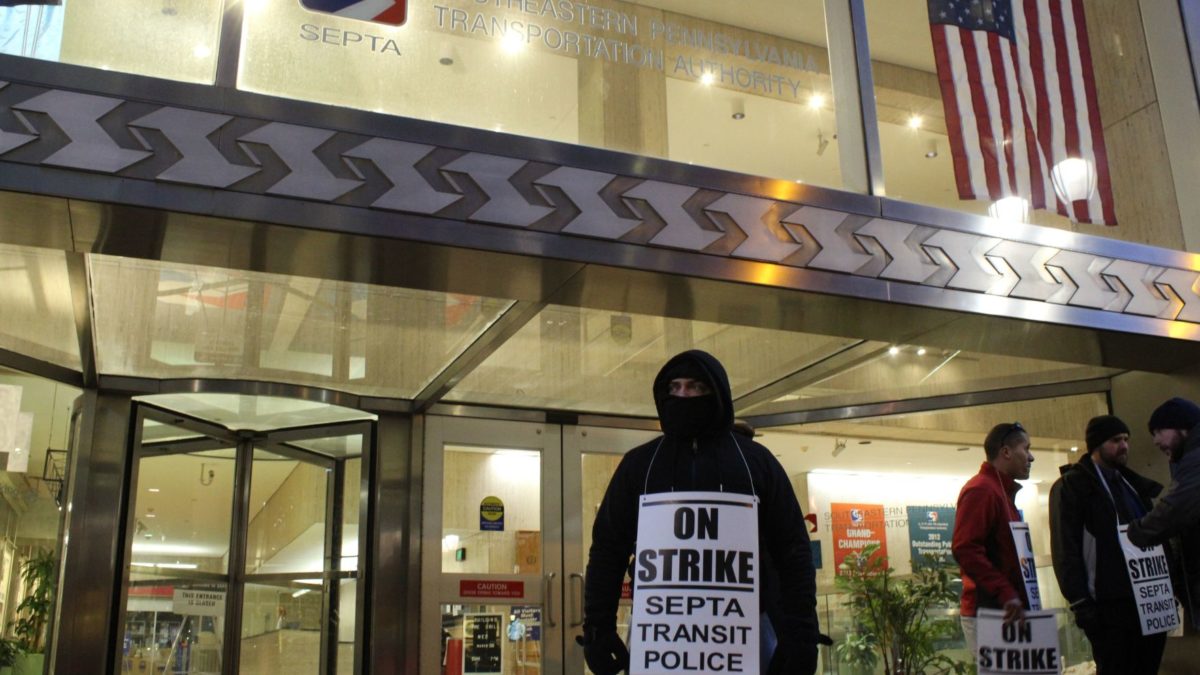Working without a contractual agreement for more than a year, SEPTA transit officers made major headway on March 17 when their union voted to ratify a five-year-contract.
The proposed settlement includes a number of stipulations for the officers, but most notably it contains across-the-board pay raises and increased access to body-worn camera (BWC) footage.
The vote arrives a week-and-a-half after tensions spilled onto 1234 Market Street when a total of 178 transit officers went on strike on March 6. Officers picketed outside SEPTA headquarters after several days of negotiations started off with promise but ended with failure to reach an agreement.
The first day of the strike was marked by a fatal stabbing in the concourse of the Broad Street Line’s Walnut-Locust Street station. On staff at the time of the incident were supervisors and Philadelphia Police Department officers who filled in for SEPTA transit officers over the course of the strike.
Officers returned to work on March 12 after its union, the Fraternal Order of Police (FOP) Transit Police Officers Lodge 109 and SEPTA management, reached a tentative deal that would need official ratification by both the union and the SEPTA board. Now that the union has voted in favor of the negotiations, the contract will be brought to the board for voting on March 28. If approved by the board, the contract will take effect on March 31.
According to Omari Bervine, president of FOP Transit Police Officers Lodge 109, previous negotiations failed due to “a work-related, non-monetary issue.” As Philly.com reported, the issue in question was an agreement on updating the BWC policy established in January 2016, which prohibits officers from reviewing footage before making statements or submitting incident reports.
Bervine also told Philly.com during the strike that police officers not having access to body camera footage before they conduct investigations puts them at risk of unintentionally providing details that conflict with the footage. This type of false statement could lead to job termination.
Pay raises and other parts of the contract, such as uniform allowances, appeared to have been resolved before the strike. Bervine explained via press release that the pay raise was needed, since they had lost almost 50 officers, approximately 20 percent of their workforce, to better-paying employment outside of transit police. He also explained that the pay gap between officers and supervisors as well as other management-level employees increased to over $30,000.
“Our job has gotten more and more dangerous over the years, and that’s a concern of ours,” FOP Lodge 109 Vice President Troy Parham told Philadelphia Weekly during the March 6 protest. “Our manpower is down, our officers have been underpaid, and that’s been an issue with people leaving to go to other departments for more money. It becomes a safety concern for our officers and for the public.”
SEPTA officers are responsible for the security of SEPTA stations and locations in Bucks, Delaware, Montgomery, Philadelphia and Chester Counties. The latest figures from Indeed.com portray the officers’ annual average salary at $50,774. However, according to Andrew Busch, SEPTA’s chief press officer, officers make a reported average annual salary of approximately $78,000 if you add overtime.
Busch said the transit police officers will receive an overall 10.5 percent increase in wages over the five year period. The increases are spaced out by a 1 percent increase in 2019, another 1 percent in 2020, 2 percent in 2021, 3 percent in 2022, and 3.5 percent in 2023.
“We certainly want to thoroughly compensate all employees,” said Busch. “The raises that were in the tentative contract agreement were consistent with what has been in our other labor contract agreements.”
In exchange, the concession the union made to SEPTA was that the offices would contribute a total of 1.5 percent more in health care costs.
Not down with BWC
After firm disagreements between the officers and SEPTA board on the BWC policy, the tentative deal came to a compromise. If ratified by the board, the new policy will allow police officers to view the footage after writing an initial incident report on a case involving an arrest or use of force, and if a discrepancy is found, submit a supplemental report without penalty.
SEPTA spokesman Busch further clarified that the supplemental reports would only pertain to “minor deviations between the initial report and what’s on the camera.” However, he did not have a response for how and who would discern what is considered “minor deviations.”
The policy would also allow officers to review the footage before being interviewed in an internal or administrative investigation. Busch explained that internal cases involving BWCs have most likely already included an incident report, an initial filing which led to the subsequent investigation.
“Obviously, [when an officer is in] the middle of dealing with an incident, we certainly don’t expect that someone is going to remember every detail of that. The language in the contract is making clear that we’re not looking at minor deviations between the initial report and what’s on the camera in an effort to try to penalize the officers,” said Busch. “We do so expect that they’re going to be candid and truthful when they when file those initial reports. But after the initial reports are filed, they would be permitted to look at them and to provide additional information and also prior to being interviewed for an internal or administrative investigation.”
Busch believes that the new protocol still retains and “preserves the spirit” of the original BWC policy.
The Leadership Conference on Civil and Human Rights as well as Upturn, both Washington D.C.-based civil rights groups, made the recommendation that officers do not need to review BWC footage before writing an incident report or statement. The recommendation was based on their review in 2017 of 75 police departments, none of which fully adopted the recommendation as discovered by the two groups. The report did not include SEPTA’s transit police, but it did include the Philadelphia Police Department.
SEPTA’s current policy is actually stricter than that of the Philadelphia Police Department which allows police officers to review footage that does not involve the use of force or hospitalization. The city police union wants to weaken the policy even more by arguing the two exceptions before the state’s labor board.
SEPTA transit officers have shown a varied amount of resistance to body cameras since their inception in 2016 as demonstrated in an audit of the BWC program’s first six months. Conducted by Dr. Jordan Hyatt from Drexel University’s Department of Criminology & Justice Studies, which showed a general improvement in day-to-day patrols. But the audit also reported a high percentage of officers not turning on their cameras or audio or having visually impaired video. Hyatt wrote in the conclusion that the compliance issues also could be attributed to the adjustment period to the new technology.
A common criticism of allowing police to review BWC footage is that it distorts memories and allows officers to change their stories in order to align with what’s depicted in the video. Abdul-Aliy Muhammad, co-founder of the Black and Brown Workers Co-op, vehemently disagreed with the planned change in SEPTA’s BWC policy.
“As a co-op that is expressly abolitionist and anti-police State we see this as creating the space for more corruption of footage, hiding of evidence and a way to get their story together before submission of body cam videos,” said Muhammad. “Cops don’t need more power, they need less.”
Muhammad further explained that the policy change is reflective of racial injustice. He brought up the case of the ex-police officer Ryan Pownall who fatally shot David Jones in Juniata back in 2017. The report stated that Pownall told an officer after the shooting that he only fired once, a claim that was proven inaccurate by the Medical Examiner’s Office and surveillance video that “established multiple shots.”
“This is bigger than a cop and camera, this is about systemic practices that result in the death of enumerable black and Brown people,” said Muhammad.
Philadelphia Weekly reached out to FOP Transit Police Officers Lodge 109 after the vote on March 17 but did not receive a response at the time of this report.
TWITTER: @ANDREAJCANTOR





